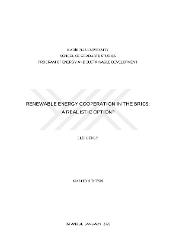| dc.contributor.advisor | Ediger, Volkan | en_US |
| dc.contributor.author | Güney, Elif | |
| dc.date.accessioned | 2021-08-02T14:36:19Z | |
| dc.date.available | 2021-08-02T14:36:19Z | |
| dc.date.issued | 2020 | |
| dc.identifier.uri | https://hdl.handle.net/20.500.12469/4147 | |
| dc.description.abstract | The energy transition from coal to oil and natural gas was a requirement for a new energy system to improve efficiency and meet future energy demand. Therefore, the increase in natural gas and renewable energy resources is expected to lead to a new energy revolution to solve resource scarcity and the main challenges of global climate change. One of the most challenging questions for this transition: "Can countries with different energy profiles and strategies cooperate on the renewable energy transition?" To answer this question, the BRICS, defined as global cooperation made up of countries exhibiting tremendous heterogeneity in economic and political circumstances, is an appropriate case for understanding the energy transition. The analysis of BRICS as renewable energy cooperation also provides a further perspective to evaluate to what extent the BRICS still matter and to what extent these countries are approaching or moving away from each other. However, there is a deficiency in combining different parameters to understand the renewable energy transition in the BRICS. With this purpose, this thesis offers a comprehensive overview of the topic by comparing and applying two theoretical concepts – path dependence and leapfrogging – to analyze the possibility of BRICS cooperation. The study first reviews country-level variations through the theoretical concepts of path dependency and leapfrogging and then presents the BRICS countries regarding their country-level variations. It then elaborates on past energy cooperation among the BRICS and evaluates the possibility of future renewable energy cooperation. At the end of the study, it is argued that the BRICS can cooperate on the renewable energy transition, but this does not mean that the experience of each country will be similar. This study suggests that cooperation on the renewable energy transition among the BRICS is possible only under certain circumstances. To foster this process, BRICS members need to re-evaluate their energy policies, encourage renewable energy development with new policies and create a well-defined structure for economic diversification away from fossil fuel dependency. | en_US |
| dc.description.abstract | Kömürden petrole ve doğal gaza olan enerji geçişi, enerji verimliliğini arttırmak ve gelecekteki enerji talebini karşılamak için yeni bir enerji sisteminin şartıdır. Bu nedenle, doğal gaz ve yenilenebilir enerji kaynaklarındaki artışın, kaynak kıtlığını ve küresel iklim değişikliğinin temel zorluklarını çözmek için yeni bir enerji devrimine yol açması beklenmektedir. Bu geçiş için en zorlu sorulardan biri: "Farklı enerji profillerine ve stratejilerine sahip ülkeler yenilenebilir enerji geçişinde işbirliği yapabilir mi?" Bu soruyu cevaplamak için, ekonomik ve politik koşullarda muazzam heterojenlik gösteren ülkelerden oluşan, küresel işbirliği olan BRICS uygun bir vakadır. Bununla birlikte, BRICS'deki yenilenebilir enerji geçişini anlamak için farklı parametrelerin birleştirilmesinde bir eksiklik vardır. Bu amaçla, bu tez, farklı ülke düzeyindeki farklılıkları ve BRICS işbirliğinin olasılığını analiz etmek için iki teorik kavramı - yol bağımlılığı ve sıçrama- karşılaştırarak ve uygulayarak konuyla ilgili kapsamlı bir genel bakış sunmaktadır. Çalışmada önce ülke düzeyindeki değişimler, yol bağımlılığı ve sıçrama ile ilgili teorik kavramlar incelenerek ardından BRICS ülkelerinde ülke düzeyindeki değişimler hakkında bilgi verilmektedir. Daha sonra, BRICS arasındaki geçmiş enerji işbirlikleri ele alınıp gelecekteki yenilenebilir enerji işbirliklerinin olasılığı değerlendirilmektedir. Çalışmanın sonunda, BRICS'in yenilenebilir enerji geçişi konusunda işbirliği yapabileceği, ancak bu her ülkenin deneyiminin benzer olacağı anlamına gelmediği iddia edilir. Bu çalışma, BRICS ülkeleri arasındaki yenilenebilir enerji geçişi konusunda işbirliğinin yalnızca belirli koşullar altında mümkün olduğunu göstermiştir. Bu süreci geliştirmek için BRICS üyelerinin, enerji politikalarını yeniden değerlendirmeleri ve yenilenebilir enerji gelişimini yeni politikalarla teşvik etmeleri gerektiği vurgulanmaktadır. Ayrıca, fosil yakıt bağımlılığından uzak ekonomik çeşitlilik için iyi tanımlanmış bir yapının gerekliliği vurgulanmaktadır. | en_US] |
| dc.language.iso | tur | en_US |
| dc.publisher | Kadir Has Üniversitesi | en_US |
| dc.rights | info:eu-repo/semantics/openAccess | en_US |
| dc.subject | N/A | en_US |
| dc.title | Renewable energy cooperation in the BRICS: A realistic option | en_US |
| dc.title.alternative | BRICS ülkelerinde yenilenebilir işbirliği: Gerçekçi bir seçenek mi | en_US |
| dc.type | masterThesis | en_US |
| dc.department | Enstitüler, Lisansüstü Eğitim Enstitüsü | en_US |
| dc.institutionauthor | Güney, Elif | en_US |
| dc.relation.publicationcategory | Tez | en_US |
| dc.identifier.yoktezid | 616191 | en_US |
















